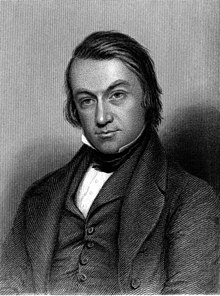Charles Mackay (author)
Appearance
(Redirected from Charles Mackay)

Charles Mackay (27 March 1814 – 24 December 1889) was a Scottish poet, journalist, and song writer.
Quotes
[edit]
But thought’s a weapon stronger;
We’ll win our battles by its aid,
Wait a little longer.

- You have no enemies, you say?
Alas, my friend, the boast is poor;
He, who has mingled in the fray
Of duty that the brave endure,
Must have made foes! If you have none,
Small is the work that you have done,
You've hit no traitor on the hip,
You've dashed no cup from perjured lip,
You've never turned the wrong to right,
You've been a coward in the fight.
- Every age has its peculiar folly; some scheme, project, or phantasy into which it plunges, spurred on either by the love of gain, the necessity of excitement, or the mere force of imitation. Failing in these, it has some madness, to which it is goaded by political or religious causes, or both combined.
- Men, it has been well said, think in herds; it will be seen that they go mad in herds, while they only recover their senses slowly, and one by one.
- He who walks through a great city to find subjects for weeping, may, God knows, find plenty at every corner to wring his heart; but let such a man walk on his course, and enjoy his grief alone — we are not of those who would accompany him. The miseries of us poor earthdwellers gain no alleviation from the sympathy of those who merely hunt them out to be pathetic over them. The weeping philosopher too often impairs his eyesight by his woe, and becomes unable from his tears to see the remedies for the evils which he deplores. Thus it will often be found that the man of no tears is the truest philanthropist, as he is the best physician who wears a cheerful face, even in the worst of cases.
- During seasons of great pestilence, men have often believed the prophecies of crazed fanatics, that the end of the world was come.
- Of all the nations in the world the French are the most renowned for singing over their grievances. Of that country it has been remarked with some truth, that its whole history may be traced in its songs.
- Nations, like individuals, cannot become desperate gamblers with impunity. Punishment is sure to overtake them sooner or later.
- The intrigues of unworthy courtiers to gain the favour of still more unworthy kings, or the records of murderous battles and sieges, have been dilated on, and told over and over again, with all the eloquence of style and all the charms of fancy; while the circumstances which have most deeply affected the morals and welfare of the people have been passed over with but slight notice, as dry and dull, and capable of neither warmth nor colouring.
- The over-bearing insolence of ignorant men, who had arisen to sudden wealth by successful gambling, made men of true gentility of mind and manners blush that gold should have power to raise the unworthy in the scale of society.
- The tulip — so named, it is said, from a Turkish word, signifying a turban — was introduced into western Europe about the middle of the sixteenth century. Conrad Gesner, who claims the merit of having brought it into repute — little dreaming of the commotion it was shortly afterwards to make in the world — says that he first saw it in the year 1559, in a garden at Augsburg, belonging to the learned Counsellor Herwart, a man very famous in his day for his collection of rare exotics. The bulbs were sent to this gentleman by a friend at Constantinople, where the flower had long been a favourite.
- The demand for tulips of a rare species increased so much in the year 1636, that regular marts for their sale were established on the Stock Exchange of Amsterdam, in Rotterdam, Harlaem, Leyden, Alkmar, Hoorn, and other towns.
- For more than a thousand years the art of alchymy captivated many noble spirits, and was believed in by millions. Its origin is involved in obscurity. Some of its devotees have claimed for it an antiquity coeval with the creation of man himself, others, again, would trace it no further back than the time of Noah.
- An epidemic terror of the end of the world has several times spread over the nations. The most remarkable was that which seized Christendom about the middle of the tenth century. Numbers of fanatics appeared in France, Germany, and Italy at that time, preaching that the thousand years prophesied in the Apocalypse as the term of the world’s duration were about to expire, and that the Son of Man would appear in the clouds to judge the godly and the ungodly. The delusion appears to have been discouraged by the Church, but it nevertheless spread rapidly among the people.
- Credulity is always greatest in times of calamity.
- The prophecies of Nostradamus consist of upwards of a thousand stanzas, each of four lines, and are to the full as obscure as the oracles of old. They take so great a latitude, both as to time and space, that they are almost sure to be fulfilled somewhere or other in the course of a few centuries.
- But among all the instances of the interference of governments with men’s hair, the most extraordinary, not only for its daring, but for its success, is that of Peter the Great, in 1705. By this time fashion had condemned the beard in every other country in Europe, and with a voice more potent than popes or emperors, had banished it from civilised society. But this only made the Russians cling more fondly to their ancient ornament, as a mark to distinguish them from foreigners, whom they hated.
Legends of the Isles and Other Poems (1851)
[edit]
As round and round we run;
And the truth shall ever come uppermost,
And justice shall be done.
- Written 1842-1845
- Cleon hath a million acres,— ne’er a one have I;
Cleon dwelleth in a palace, — in a cottage I.- "Cleon and I"
- They may veil their eyes, but they cannot hide
The sun’s meridian glow;
The heel of a priest may tread thee down,
And a tyrant work thee woe:
But never a truth has been destroyed;
They may curse it, and call it crime;
Pervert and betray, or slander and slay
Its teachers for a time.
But the sunshine aye shall light the sky,
As round and round we run;
And the truth shall ever come uppermost,
And justice shall be done.- "Eternal Justice", Stanza 4
- Aid the dawning, tongue and pen;
Aid it, hopes of honest men!- "Clear the Way"
- Some love to roam o’er the dark sea’s foam,
Where the shrill winds whistle free.- "Some Love to Roam"
- Old Tubal Cain was a man of might
In the days when earth was young.- "Tubal Cain"
Voices from the Crowd, and Town Lyrics (1857)
[edit]
Each wavelet on the ocean tost
Aids in the ebb-tide or the flow;
Each rain-drop makes some floweret blow;
Each struggle lessens human woe.
"What dost thou see, lone watcher on the tower
Is the day breaking? comes the wish'd-for hour?
Tell us the signs, and stretch abroad thy hand
If the bright morning dawns upon the land.""The stars are clear above me, scarcely one
Has dimm'd its rays in reverence to the sun;
But yet I see, on the horizon's verge,
Some fair, faint streaks, as if the light would surge."- "The Watcher On The Tower"
- There’s a good time coming, boys!
A good time coming.
We may not live to see the day,
But earth shall glisten in the ray
Of the good time coming.
Cannon-balls may aid the truth
But thought’s a weapon stronger;
We’ll win our battles by its aid,
Wait a little longer.- "The Good Time Coming"
- The smallest effort is not lost,
Each wavelet on the ocean tost
Aids in the ebb-tide or the flow;
Each rain-drop makes some floweret blow;
Each struggle lessens human woe.- "The Old and the New"
The Collected Songs of Charles Mackay (1859)
[edit]- The king can drink the best of wine;
So can I:
And has enough when he would dine —
So have I;
He cannot order rain or shine;
Nor can I.
Then, where's the difference — let me see —
Betwixt my lord the king and me?- "Differences", I
- I wear the cap and he the crown;—
What of that?
I sleep on straw and he on down;—
What of that?
And he's the king and I'm the clown;—
What of that?
If happy I, — and wretched he, —
Perhaps the king would change with me!- "Differences", V
External links
[edit] Encyclopedic article on Charles Mackay on Wikipedia
Encyclopedic article on Charles Mackay on Wikipedia Media related to Charles Mackay on Wikimedia Commons
Media related to Charles Mackay on Wikimedia Commons Works related to Author:Charles Mackay (1814-1889) on Wikisource
Works related to Author:Charles Mackay (1814-1889) on Wikisource- Works by Charles Mackay at Project Gutenberg
- Extraordinary Popular Delusions and the Madness of Crowds online
